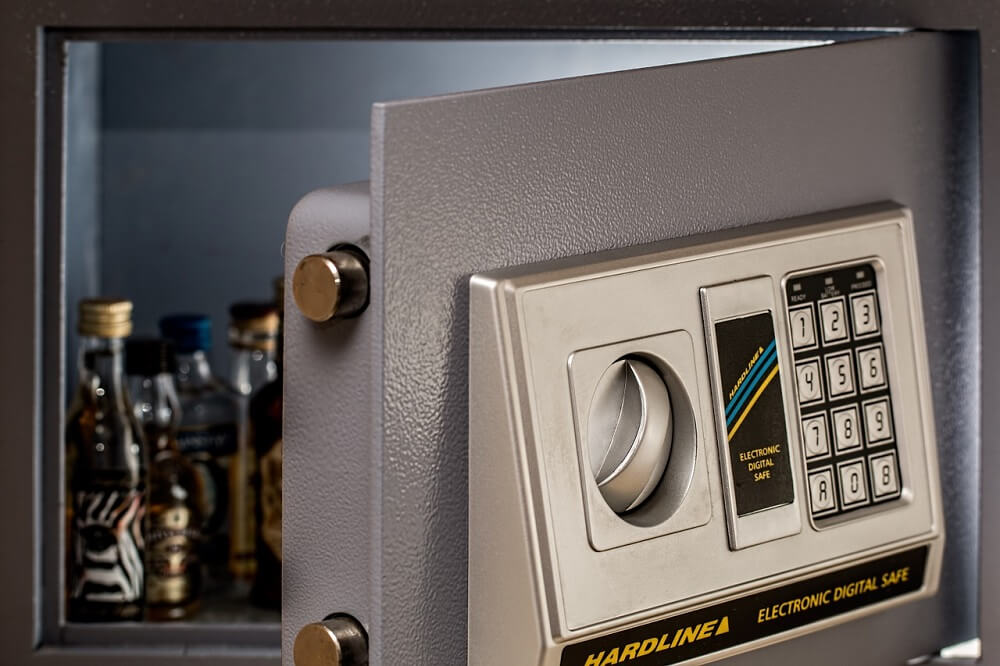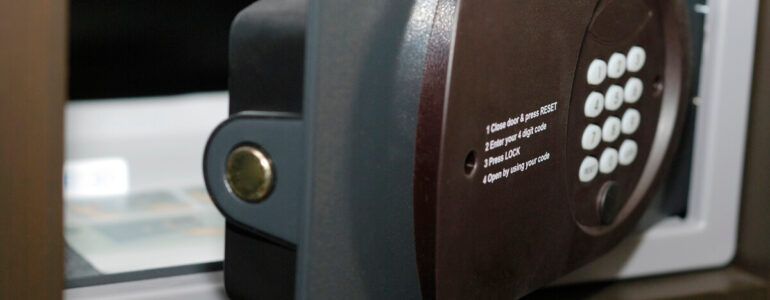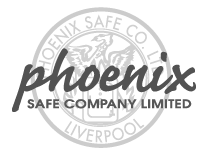When you want to secure something valuable, most people automatically think about a safe. But is it the best way to store your valuables?
Afterall, burglars have been known to steal entire safes. A safe also doesn’t guarantee that your valuables will be safe from all dangers including fire and flood damage.
So is a home safe a good idea? It depends on the kind of safe you plan to get and what you put in it.
Is a Home Safe Worth It?

If burglars can carry away a safe or break it open, is it worthwhile to get one?
In most cases, yes, a home safe is worth it. It provides a deterrence against most burglars. Remember that burglars want to be in and out as quickly as possible before they are spotted. So anything that slows them down is a good deterrence.
If you have jewellery, cash and other valuables you want to secure, a home safe can be a great place to store them.
That said, whether a home safe is worth it depends on the quality and type of safe you get. There are plenty of cheap home safes in the market today, but they are only good for storing low-value items worth a couple thousand pounds or less.
If you have jewellery worth thousands or tens of thousands of pounds, then a cheap safe is not worth it.
These budget safes are made with thin metal that burglars can easily cut or drill through. They also tend to have low-security locks that are easy for burglars to pick or break.
If you want to secure high-value, sentimental or sensitive items, then invest in a premium and high quality safe.
Here are some additional tips to keep in mind when shopping for a safe.
- Get a safe that attaches to the floor or the wall. Don’t assume that because a safe is heavy, burglars won’t carry it away. Multiple burglars will easily load it into a vehicle and carry it off. Attaching a safe to the floor or wall provides an extra layer of security.
- For high-value items, fire and water protection is crucial. Don’t just get a safe that’s burglar-proof; it should also be resistant to fire and water.
- If you plan to store items that are insured, check with your insurer first. They might have minimum requirements for a safe that you need to comply with.
- Past a certain value of items, consider whether it is really worth it to keep them at home. A bank safety deposit box is a more secure option.
Are Home Safes Fireproof?
Because it’s all metal, it’s easy to assume that any safe is fireproof. In reality, budget safes are not designed to resist fire damage. If the fire burns hot enough, it could melt the safe and destroy whatever’s inside.
Even if the safe doesn’t melt, the interior could get hot enough to ignite your valuables especially if they burn easily such as money or documents.
If you want to protect your valuables from fire, it is important that you specifically look for a fireproof safe.
Keep in mind that no safe, even an expensive one, is completely fireproof. Leave it long enough in a fire and it’ll melt or burn its contents.
Rather, fireproof safes have different fire ratings. These ratings indicate how long a safe can withstand a fire at a particular temperature without melting and while maintaining a relatively cool interior temperature.
Standard fireproof safes can endure fires for about 30 minutes while safes with a maximum fire rating can survive a 2+ hour fire. Highly rated fireproof safes are also designed to withstand fiery explosions.
Are Home Safes Waterproof?
Unless it is stated in the product manual or description, assume that any safe you come across is not waterproof. Most low budget safes are certainly not waterproof or even water resistant.
As with fire, you have to specifically look for a waterproof safe if you want to protect your valuables from water damage such as during a flood.
Generally, most fireproof safes are also waterproof. So you can easily get these two features in one home safe. But again as we saw with fireproof safes, there is no safe that’s 100% waterproof.
Leave any safe submerged in water long enough and it will eventually let in some water. So check how long a particular safe can remain waterproof before you buy it. Most waterproof safes provided up to 24 hours of protection.
Home Safe vs. Safety Deposit Box
Some items are just too valuable to keep in a home safe. A safety deposit box at the bank is a lot safer than a safe at home.
Not only is it practically impossible for burglars to access your valuables there, a safety deposit box also usually has better protection against fires, floods and other hazards.
Some of the items that are ideal for storing in a safety deposit box include family heirlooms, expensive jewellery, important documents such as birth certificate and title deed and computer backups of important data.
Basically, anything that is highly valuable or is difficult to replace.
The main downsides of a safety deposit box are cost and access.
A home safe only costs you when you purchase it. After that, no one asks you for more money to keep your valuables in it. In contrast, you have to pay the bank an annual fee between £200 and £1200 depending on the size of the box.
But it’s worth it if you are storing valuable or expensive items.
The other issue is that you cannot access a safety deposit box whenever you want. It’s only accessible during bank hours and you have to prove your identity. So if you have anything you need to access frequently, such as a gold necklace that you wear often, a safety deposit box may not be the best option.
Something else to keep in mind is that whatever you put in a safety deposit box is not insured by the bank. But some home insures can offer to cover items in a safety deposit box through a high value home insurance policy.
Safe vs. Lockbox: Which One Should You Get?
A lockbox is basically a less secure safe. Lockboxes are common in places like shops or markets where they are used to store small amounts of money.
Unlike a safe that’s made with thick and strong steel, a lockbox is typically made with thinner metal and usually has a simpler lock that is easier and faster to open.
Because they are easier to break into, lockboxes are only ideal for storing low value items like petty cash, spare keys and medical supplies.
A lockbox is also the best choice if you need a lighter and more portable alternative to a safe, e.g. for your car or RV.
You can see from LockPickingLawyer’s video how easy it is to open a lockbox even if you don’t know the combination.
Where to Install A Safe At Home
We’ve already mentioned that the wall or floor is the best place to install a home safe. But where exactly in your home is the ideal location for a safe?
It depends on the size of the safe, the level of security you want and ease of access.
Say you want to store items that you can quickly access at any time. In that case, a location like your bedroom is great. On the downside, locations that are easily accessible to you are also easily accessible to burglars.
If they have enough time, they may attempt to crack open the safe or even pry it from the wall/floor.
For the best security, install the safe where burglars are unlikely to look for it or will find it hard to access. The basement and attic are some of the best places to install a safe. These areas are typically cluttered and burglars often don’t think of searching them. Lock the door to these rooms for extra security.
If you have to install a safe somewhere more accessible like the study or living room, consider recessing it into the wall or floor then covering it with something else like a rug or artwork.
Try to avoid installing the safe in obvious places such as inside the closet. Burglars know where most homeowners hide their valuables and will easily find the safe.
Also avoid places where the contents of the safe might get damaged by moisture or extreme temperatures. So the garage is out of the question.
Final Thoughts
A safe, any safe, is better than having no safe at all. You might think you can hide your money or jewellery from burglars, but they know all the hiding places. They might even check that fake soda can hidden storage that you think no one can notice.
A safe, even a cheap one, provides some security against theft. The most important thing to remember is that you get what you pay for.
A cheap safe will be easier to break and is not worth it if you want to store valuable items. A high-security safe will cost more but it’ll provide solid security against most burglars.







